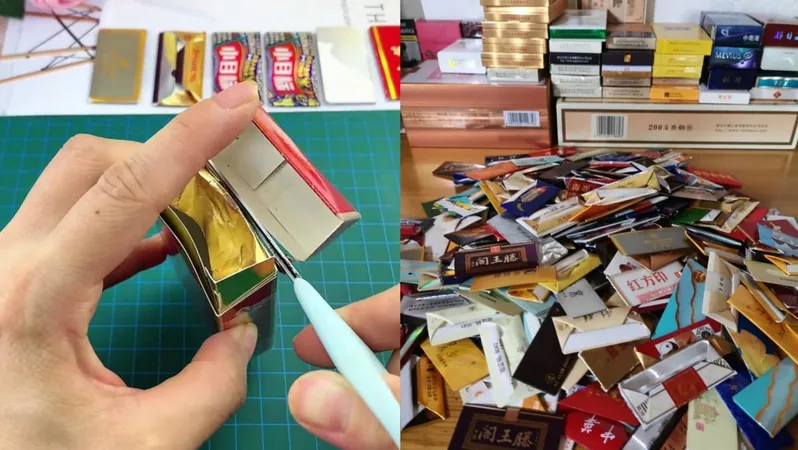
China Takes Action Against 'Cigarette Cards' Trading Among Minors
2024-12-11
Author: Li
Introduction
Chinese authorities are ramping up efforts to combat the growing trend of 'cigarette cards' among minors, a practice that has alarmed consumer protection groups and health advocates alike. These cards, crafted from used cigarette packs, have found their way into playgrounds, leading some children to exhibit an alarming interest in smoking culture.
Regulatory Actions
Recent discussions held by the Chinese Association on Tobacco Control focused on imposing strict regulations against the sale and distribution of these cards. The rise in popularity, particularly in urban areas like Beijing and Jiangsu province, has prompted calls for law enforcement to crack down on unregulated sales both in stores and on e-commerce platforms.
Consumer Council Warnings
Warnings issued by the Jiangsu Consumer Council emphasize that these cigarette cards are more than mere collectibles; they pose a direct risk by normalizing tobacco brands and encouraging children to engage with smoking at a young age. Experts argue that this could pave the way to future addiction, with insider Li Enze from the Chinese Anti-Tobacco Association referring to cigarette cards as a “gateway to tobacco use.”
School Responses
In schools across major Chinese cities, teachers have reported scenes where students trade these cards openly, leading to classroom distractions and sometimes conflicts. A primary school educator in Shanghai noted that the cards not only disrupt learning but also cultivate an unhealthy allure surrounding cigarette brands. As a result, some schools have actively prohibited these cards from campus.
Cultural Context
The phenomenon of cigarette cards, locally known as “yan ka” (translated to “smoke card”), has deep roots in Chinese culture, reminiscent of similar practices from the 1970s. Children sport fancy undamaged brands, and the thrill of trading contributes to their value. Yet, despite existing bans on tobacco sales to minors, empty packets are easily accessible for as little as 1 yuan (approximately $0.14) at nearby convenience stores. Some have even resorted to scavenging discarded packets from streets or dumpsters, underscoring the lengths youths will go to partake in this trend.
Criminal Activities
Alarming incidents have emerged, with reports surfacing of minors engaging in criminal activities to acquire these cards. One notable case involved six youths in Sichuan who stole high-end cigarettes worth over 60,000 yuan, ultimately throwing the actual tobacco away to collect the packaging. Such behaviors raise serious public safety concerns, further complicating the issue.
E-commerce Scrutiny
Chinese e-commerce platforms, like Taobao, have come under scrutiny for allowing the sale of these cards without age verification, often marketed as toys or collectibles. Sellers have defended their operations as legal, highlighting the lack of harmful content in their products.
Expert Opinions
As China grapples with these issues, experts stress that while enforcement is essential, a nuanced approach is required. Education plays a crucial role in changing perceptions and behaviors around smoking for younger generations. Yang Jie, a researcher at the Chinese Center for Disease Control and Prevention, advocates for intensified crackdowns on illegal sales, while also promoting awareness about the health risks associated with smoking.
Alternative Solutions
Counselor Yao Mei suggests that an outright ban might intensify the appeal of cigarette cards among children. She advocates for providing alternative games that fulfill the same social bonding and competitive spirit that these cards bring, thus steering youth away from tobacco culture.
Conclusion
As authorities devise strategies to mitigate this trend, it remains important to continue fostering healthier pastimes and strengthening educational efforts to instill better values and awareness among children regarding the dangers of tobacco. China’s fight against tobacco-related issues is just beginning, and the implications for the nation’s youth are more critical than ever.


 Brasil (PT)
Brasil (PT)
 Canada (EN)
Canada (EN)
 Chile (ES)
Chile (ES)
 España (ES)
España (ES)
 France (FR)
France (FR)
 Hong Kong (EN)
Hong Kong (EN)
 Italia (IT)
Italia (IT)
 日本 (JA)
日本 (JA)
 Magyarország (HU)
Magyarország (HU)
 Norge (NO)
Norge (NO)
 Polska (PL)
Polska (PL)
 Schweiz (DE)
Schweiz (DE)
 Singapore (EN)
Singapore (EN)
 Sverige (SV)
Sverige (SV)
 Suomi (FI)
Suomi (FI)
 Türkiye (TR)
Türkiye (TR)